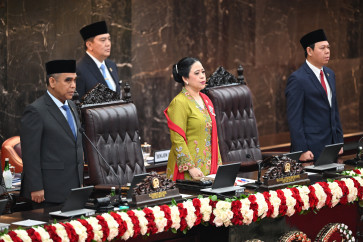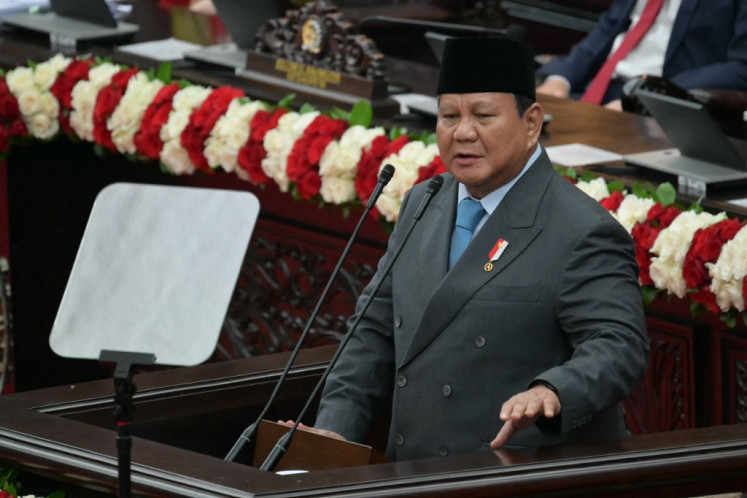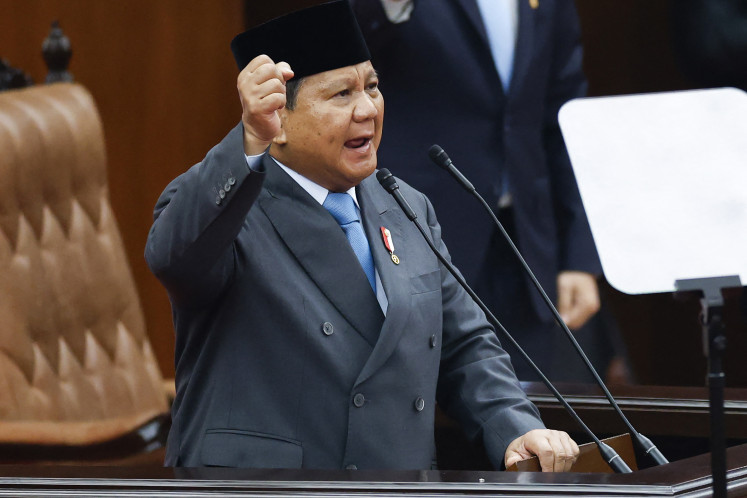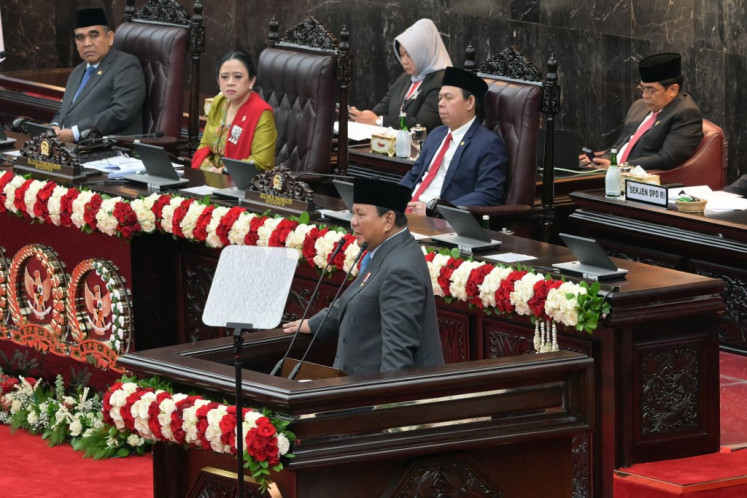Popular Reads
Top Results
Can't find what you're looking for?
View all search resultsPopular Reads
Top Results
Can't find what you're looking for?
View all search resultsIndonesia’s solidarity urgent for repressed nations
Indonesians remain wary of religious justifications of violence against civilians: On Dec. 7, a suicide bomber, a convict released on parole last year, attacked a police station in Bandung, West Java, killing one policeman.
Change text size
Gift Premium Articles
to Anyone
J
ina Amini was her name, the Kurdish name reportedly banned by Iran’s authorities, hence her official Persian name, Mahsa Amini, with her Kurdish identity virtually erased. At 22 years old, since her death in custody in September, demonstrators in Iran and beyond have shouted “Jin, jiyan, azadi!” (woman, life, freedom). They unwittingly adopted the slogan of the ethnic minority’s liberation movement against Iran’s regime, wrote Kurdish student Dalal Hassane in The Harvard Crimson in early November.
In some six weeks of protests about 16,000 have been arrested and hundreds have been killed, including security personnel and at least three teenagers.
Ahead of International Human Rights Day on Dec. 10, Iran hanged a protester, Mohsen Shekari, for “enmity against God” on Dec. 8, reports said. Eleven other demonstrators are on death row.
Populations under brutal regimes look to Indonesia’s leadership to voice solidarity, to urge their governments to stop the abuse of religion or their followers through identity politics, as participants of the Second Indonesian Women Ulema Congress (KUPI) held in Semarang and Jepara, Central Java, discussed on Nov. 24-26.
As chair of ASEAN next year and with its vast Muslim population Indonesia cannot stay silent on the suffering of millions of fellow Asians and Muslims while campaigning “moderate Islam” and its humanitarian Pancasila ideology,
Even if few may have heard of “women, ulema, fatwa” in one breath, the new non-binding religious edicts issued by the above congress reflect careful analysis of religious texts and their abuse by the state and powerful influencers.
Their main source of edicts include women’s experiences. The stories of the speakers, though widely reported and rebuffed by governments, stunned audiences of women and minorities bearing the brunt of state-sponsored attempts at eradicating identities and suppressing their own civilians, echoing colonial regimes.
As cited in a United Nations report on the Uyghur minority, for instance, China’s confirmation of the existence of over 10,000 persons listed in the Xinjiang Victims Database, a platform used by Uyghurs outside China, apparently has not led to state facilitation of families to connect with their missing loved ones. Authorities said they were either “living a normal life,” in detention on terrorism charges or had died of diseases and other causes. Uyghur campaigner Rushan Abbas, whose sister was said to be among detainees, described horrendous details of the alleged “genocide” of the ethnic minority.
Yet despite today’s “fragile democracies” and dictatorships, “look at the resistance,” said Rosalia Sciortino, founder of the Bangkok-based SEA Junction focusing on Southeast Asia.
All movements, whether religious or secular, led by women and youth, stressed their desired principles more than mere democratic institutions like elections, she said. Powerful groups have abused elections to dominate state and society. Young protesters such as in Myanmar and Thailand have expressed clear visions for their countries, Sciortino added, inclusivity and respect for diversity, gender equality, human rights.
Qutub Jahan Kidwai, leader of India’s Network for Education, Empowerment, Development and Awareness told the audience that “Muslim women have fought fanatical forces [...] that dictate what to wear, what to read, where to go, whom to love.”
Therefore, the congress urged women to be in the forefront as peacebuilders and voices of moderation.
Indonesians remain wary of religious justifications of violence against civilians. On Dec. 7, a suicide bomber, a convict released on parole last year, attacked a police station in Bandung, West Java, killing one policeman. Among the most affected were his widow and three orphaned children. Women have also been involved in terrorist attempts. In Surabaya in 2018, a couple involved their three children as suicide bombers.
Amid conflict and trauma, a speaker from Syria said, “Opening dialogue is the first thing that a woman does […] you feel solidarity with other women as the most fragile groups.”
In the initial months of the “Arab Spring,” Abir Hajibrahim said, “we forgot the children and teenagers. We were so preoccupied with the revolution and listening to Westerners’ [advice]. When ISIS [Islamic State] came [around 2014] it was very easy for them to grab children and put weapons in their hands and they left school. Now her movement, the Mobaderoon network for peace education in the Arab region, engages with teenage girls through social and economic empowerment,” Hajibrahim said.
Teenagers kept joining dangerous rallies as they could not imagine a future with everything controlled by religious authorities, speakers said.
“Thousands say enough is enough, we want religion to be separated from the state, we don’t want the government to use religion to suppress people,” Iranian filmmaker Shimin Azameh said.
Particularly Muslim-dominated nations should continue to condemn the abuse of religion to deny citizens “our God-given rights,” said Jamila Afghani of Afghanistan, from her home in exile.
The awardee of a number of peace prizes helped provide education for 6,000 imams on the dignity of women in Islam and homeschooling for children who lost years of education in the war.
Last week Indonesia and Qatar co-hosted the International Conference on Afghan Women’s Education in Bali, to rally global support for Afghan women’s education, The Jakarta Post reported.
A heroine from Kenya, Shamsa Abubakar Fadhil, is “Mama Sham” to thousands of boys who would otherwise rot in jail with other young members of menacing gangs such as the Al Shabab. Few supported her early efforts in approaching “unchangeable” violent boys. She found “frustrated” boys had joined such gangs waving the banner of Islam, as forever scolding parents had no means to send them to school.
Despite such efforts the women ulema said women were mostly left out from decisionmaking in conflict and post-conflict situations.
Patriarchy remains a major barrier. Nevertheless, Indonesia’s only woman on the current Elections Supervisory Board, Lolly Suhenty, insists on women’s central role in decision making and claiming their rights “which will not be given for free.” A few areas in Indonesia with female leaders “are a source for optimism”, she said.
In the case of Myanmar, Indonesia has been the leading country pushing forward, though perhaps too cautiously, to show the junta that ASEAN does not condone governments, let alone members, terrorizing their own people.
Indonesia should also continue to make its position clear to friendly but cruel governments, even as it seeks their cooperation and investment. As Mama Sham told me, “there is no religiosity without humanity,” no less for the umarah (entrusted leaders).
***
The writer is a participant of the Second Indonesian Women Ulema Congress in Jepara, Central Java.










